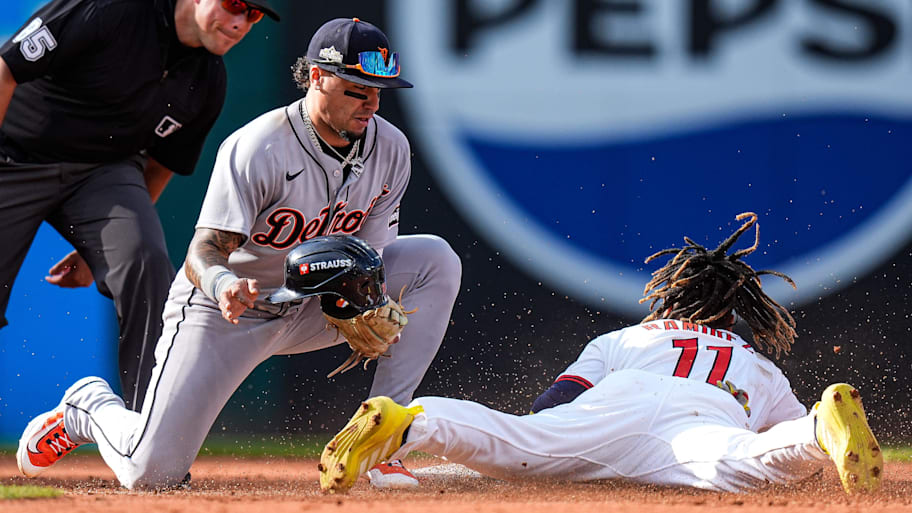
The Guardians, despite their perennially small payroll, are a team that deals in outsized superlatives—the longest World Series drought, the longest no-hitter drought, and the largest in-season comeback in baseball history.
Despite accomplishing the last of those feats this season, Cleveland's 6–3 loss in Game 3 of its wild-card series against the Tigers Thursday ensured the first will continue. The Guardians had a runner on third in the ninth inning of Game 1 trailing by one run and won Game 2—only for the wheels to come off in a Game 3 that laid out the team's litany of flaws.
When the dust settles, Cleveland—rudderless and sub-.500 in early July—can reminisce fondly on essentially stealing a quality year as it phases in a new generation of talent. Here's a look at the problems that cost the Guardians against Detroit and the lessons the losing team can draw from them.
1. An already threadbare offense disappeared
The number ".226" followed Cleveland around like a specter during its short playoff stint—that was the team's batting average this year, the worst in the franchise's long history. The Guardians' .296 on-base percentage was a 53-year low; their .373 slugging percentage was a low for any full season this century. Even in September and October, the team hit just .242.
Lazy an observation as it may be, it is almost impossible to hit as poorly as Cleveland did all year and do protracted damage in the playoffs—even with a pitching staff as effective as the Guardians'. Thus, a one-run lead for the Tigers in Game 1 became insurmountable, and only a big eighth inning could save Cleveland in Game 2.
The Guardians, zealous platoon advocates, gave a glut of at-bats early on to some of their worst hitters: right fielder Johnathan Rodriguez (.197), first baseman Jhonkensy Noel (.162), and catcher Austin Hedges (.161) took seven at-bats combined (Hedges drew two walks in Game 1). When they rolled the dice on young talents such as right fielder George Valera and center fielder Chase DeLauter from Game 2 onward, the offense seemed to receive a modest jolt—perhaps a preview of coming attractions for 2026.
2. Small mistakes proved costly
Cleveland's defense-and-fundamentals-first approach—while undeniably entertaining to watch—had the adverse effect of shrinking the Guardians' margin of error to near zero. The trouble began for Cleveland in the first inning of Game 1, when Rodriguez misplayed a fly ball that opened the door for Detroit to score the first run of the series. Noel, too, made a costly error while playing out of his natural position (though manager Stephen Vogt correctly gave him credit for ensuring the play didn't go even more haywire).
Even third baseman José Ramírez—the Guardians' nerve center for over a decade now and a future first-ballot Hall of Famer—wasn't immune to the blunders Cleveland so carefully avoided late in the season. He ran into a crucial out in the ninth inning of Game 1, and in Game 3 appeared to slow up running to second base after a Tigers error—only for pitcher Will Vest to throw him out and extinguish the Guardians' last significant threat.
3. The Tigers beat them at their own game
On Sept. 23, Cleveland beat Detroit during its furious push for the division title with the help of a classic display of small ball. The Guardians stitched together two bunts, an infield hit, a wild pitch, a balk and a groundout to scrounge out three of their five runs in a 5–2 victory. It was part of a streak where every break in the American League seemed to be vacuumed into a black hole on the shores of Lake Erie.
As it turns out, the Tigers—a team, as ESPN announcers Sean McDonough and Todd Frazier pointed out, had five sacrifice hits all season—are quick learners. Detroit turned that formula back on Cleveland on multiple occasions this series, taking the lead in Game 1 on a well-placed bunt by third baseman Zach McKinstry (dubbed the "Zachrifice" by the Tigers' X account). Center fielder Parker Meadows, too, chipped in with a critical bunt in Game 3. The moral of this story for the Guardians may be the sheer fungibility of their luck-centric approach over the long term—but Cleveland fans can take heart in the knowledge that their front office's eagerness to control every variable has kept the Guardians one of baseball's most vital organizations for a decade and counting.
More MLB on Sports Illustrated
This article was originally published on www.si.com as MLB Playoffs: Three Reasons the Guardians Were Eliminated By the Tigers.







